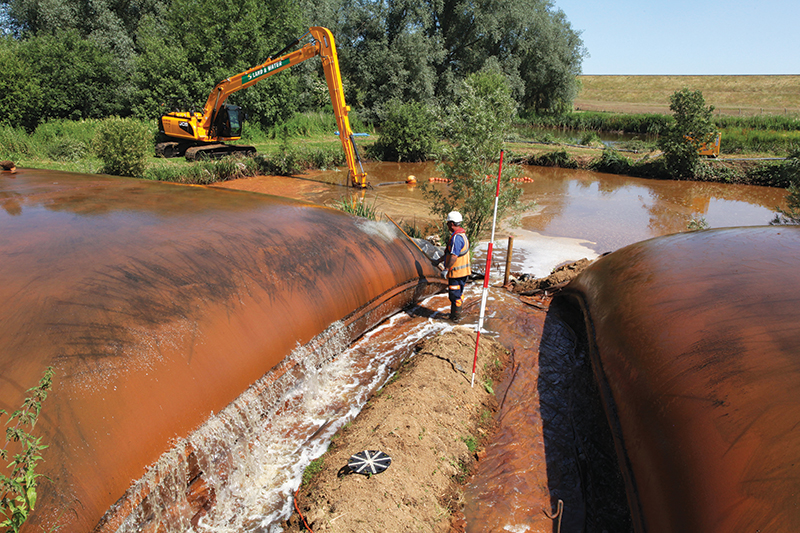Rapid Sludge Dewatering

First published in the July 2014 issue of Quarry Management
Land and Water Services Ltd utilize Geotube technology for accelerated on-site dewatering of sludges
As part of their quest to find innovative treatment and reuse solutions for difficult and wet waste materials, Land and Water Services Ltd (LAWS) have been using TenCate Geotube technology for accelerated on-site dewatering of difficult sludges for Anglian Water Services plc. On a live contract at Pitsford Water Treatment Works, Geotube technology, combined with LAWS innovative, low-impact dredging techniques, has seen a substantial reduction in the overall quantities of difficult materials for disposal.
TenCate Geotube bags are constructed of high-strength, permeable, specially engineered geotextiles designed for containment and dewatering of high moisture content sludge and sediment. They are available in a variety of sizes, depending on volume and space requirements.
Dredging operations
Dredging works can be conducted with the water remaining in the water body, which negates the need for expensive dewatering, fish rescue and habitat protection measures – the ‘status quo’ is maintained throughout the operation. For larger contracts a LAWS road-transportable cutter-suction dredger can be deployed. With a 10in suction head, this unit can achieve high dredge outputs in water depths from 600mm to 6m.
On smaller projects one of LAWS versatile amphibious tool carriers can be equipped with a 4in capacity boom-mounted, scroll-feed suction pump; and on sites where bankside access is acceptable, a dipper-mounted, high-capacity sludge pump can be fitted to any of LAW’s fleet of 52 long-reach excavators.
Rapid dewatering
The sludge mixtures are delivered, via pipeline, directly to the TenCate Geotube containment system. Constant monitoring of the input feed pipes allows the dedicated process engineer to adjust and inject the correct proportion of polymers and coagulants to the pump mix immediately prior to it entering the bag.
Once inside the bag the sludge and flocculent mix causes the rapid binding of the free sludge particles, liberating clean water. The clean water is then ejected from the micro-pores of the Geotube bag and returned to the water body, leaving high concentrates of the sludge within the bag.
While up to 99% of the particulates are retained within the bags, the bulk of the water is liberated instantly. After the final cycle of filling and dewatering, the solids remain in the bag and continue to increase in density due to desiccation as residual water vapour escapes through the fabric. As a result, when the bag is finally opened the sludge concentration has significantly increased leaving a dry ‘soil’ to be excavated for recycling or controlled disposal.
Versatile configuration
Geotube bags can be configured to suit individual sites with minimal space and/or differing sludge make-up using expert technical and installation teams. The containers are arranged on a temporarily lined surface such that any clean waters that are released from the bags are swiftly returned to the water body under gravity. Where appropriate, drinking water quality polymers are used to ensure that no negative impacts are reflected back to the originating water body.
At Pitsford Water Treatment Works, LAWS successfully completed the dredging and recovery of more than 2,500m3 of fine-particle sediments, resulting in a final retained volume in the dewatered bags of less than 400m3.
Commenting on the use of this technology and the scope of application, Steve Massey, Land and Water’s divisional business manager, said: ‘This method delivers a solution to clients whereby they can dramatically reduce the quantity of sludge for disposal in a quick and safe manner, and with minimal impact on the environment.’
Gary Cunliffe, bio-solids recycling and environmental compliance manager for Anglian Water Services, added: ‘Using the Geotube technology allows us to separate solids from liquid at site and provides savings on haulage and disposal costs, as well as drastically reducing the carbon footprint of lagoon sludge dewatering.’
- Subscribe to Quarry Management, the monthly journal for the mineral products industry, to read articles before they appear on Agg-Net






